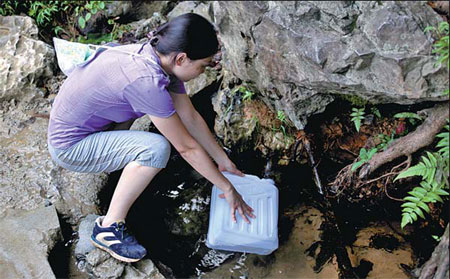The local diet is healthy, too. It includes corn, rice, millet, sweet potato, soybean, snailflower beans and green soybeans, pumpkin stems, sweet potato leaves, pak choi, mushrooms, pork, goat, chicken and duck.
 |
| People like to drink the spring water from Baimo cave in Bama. Huo yan / China Daily |
The 'bird people'
However, things are changing. In recent years, tens of thousands of "migratory bird people" have arrived to take advantage of the environment. Most have chronic diseases or cancer.
"The bird people will never have the same lifestyle as the locals, because they are ruining it", complained Liang Shao'en, a local civil servant.
The streets are full of ads for longevity-related products and restaurant menus emphasize the life-prolonging effects of the local diet.
About 2 million people visited Bama in 2012, accounting for 48 percent of its GDP. Take Poyue village: The local population of 400 has been swamped by the bird people, whose numbers have swollen from 1,500 in 2004 to 20,000 at present.
Work on Bama's only sewage treatment facility will not be finished for several years, so all the domestic wastewater ends up in the Panyang River, the main water source for locals. Contaminated water from a nonferrous metal mine in Fengshan county, on the upper reaches of the river, has leeched into the water supply and the quality has deteriorated.
The villagers have not drunk river water for at least five years, preferring to use mountain springs instead.
Changshou, or "Longevity", village has a population of 500 and is situated near a water source called Dragon Spring. However, the source pool dried up after locals set up a series of plastic pipes and a water pump to deliver water directly to the inns where the bird people reside.
At first, the incomers rented the villagers' houses, but now they offer them money to build houses on their land, reshaping the village with iron, steel and cement.
Two malodorous garbage dumps dominate the landscape at the foot of a mountain close to Baimo cave, a local tourist spot.
"We haven't enough manpower to carry the refuse away", admitted Liang. "Before the bird people came, the village garbage was biodegradable and was put into septic tanks."
Thousands of bird people, in pajamas, shorts, vests, in armchairs and on crutches, flock together in front of the cave every evening. Each carries a plastic bottle.
Some sit dazed, some walk and clap their hands as a keep-fit exercise and some dance. No matter, they all keep their eyes firmly fixed on the cave, which appears to them as the source of a magic elixir.
Two cancer patients, a man in his 60s from Shenzhen, Guangdong province, and a woman in her 50s from Jiangxi province, were breathing the air in the cave. The man said: "I will live here till I die." The woman replied, "So will I. I can't afford to go to the hospital at home."
Zeng Xingmin, 53, and her husband have lived in Longevity village for three years, "My husband is an alcoholic and has hypertension. His blood pressure returned to normal after we stayed here for three months. My diabetes is also alleviated. I don't need to take artificial insulin here," said Zeng.
She persuaded her former neighbor, Yang Yuanming, a retired grammar school teacher from Luodian county, Guizhou province, to relocate to Bama. "My physical condition is very poor. But I feel comfortable and energetic here. The terrestrial magnetism casts a spell over the water and air", said Yang. She and Zeng drink eight bottles of local spring water every day, as if each sip will extend their life for a fixed time.
